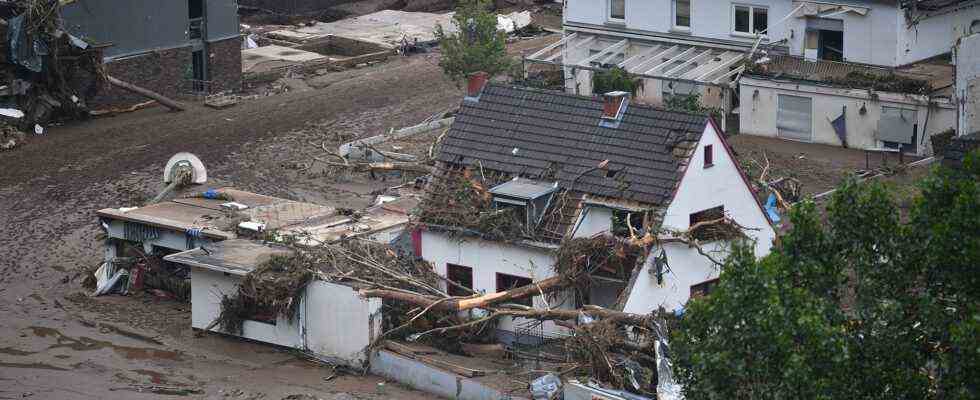Status: 07/18/2021 11:03 a.m.
After the storms in several federal states, the insurance industry criticized the lack of adaptation to the consequences of climate change. A spiral of further disasters and increasing damage must be prevented.
After the devastating floods in western Germany, the insurance industry is calling on politicians to rethink. “Adaptation to the effects of climate change is neglected in many places,” said Jörg Asmussen, General Manager of the Association of the German Insurance Industry (GDV), of “Welt am Sonntag”. Construction is still going on in floodplains, areas are sealed unhindered and investments in preventive measures are piling up at the municipal level.
“It is important to change direction here, otherwise a spiral of further catastrophes and increasing damage will set in motion, which will only become expensive and at some point unaffordable,” said Asmussen. It is becoming apparent that the current year will be one of the most damaging in the recent past.
The German boss of the French insurance group Axa, Alexander Vollert, described the severity of the property damage and the large regional spread as unique. “We’re not talking about floods here, but about storm surges on a large scale,” Vollert told the newspaper.
According to Allianz board member Jochen Haug, it is too early to make statements about the “but certainly considerable extent of damage”, the report said. The group is currently bringing together its experts from all over Germany in order to be available to customers in the affected areas on site and to be able to help quickly.
City federation calls for reform of civil protection
In view of the numerous deaths caused by the storms, the Association of Towns and Municipalities calls for a reform of civil protection. “The catastrophe shows once again that we have to reorganize civil protection, better and more sustainably,” said chief executive Gerd Landsberg to the newspapers of the “Funke Mediengruppe”. According to Landsberg, the Federal Office for Civil Protection and Disaster Relief in particular should be significantly strengthened.
The top municipal representative also spoke out in favor of modernized warning systems. With the appropriate digitization, they should be expanded into a communication network “that still works if the power has failed across the board”. A battery-operated radio belongs in every household. Correct behavior in dangerous situations, turning off electricity and gas, not entering basement rooms and keeping certain food reserves should also become standard, according to Landsberg.
Stock up on depots with essential items
Landsberg explained that it would also be necessary to keep a greater number of depots with essential items that could be quickly distributed to those affected. He named emergency power generators, tents, blankets, hygiene articles and medical products as examples. Landsberg criticized this catastrophe that initially gave the impression that it was a great heavy rain, without the dramatic extent having been communicated. “That is why many citizens were surprised by the flood disaster.” To make matters worse, the cell phone networks also failed very quickly.
Daniel Osberghaus from the Leibniz Center for European Economic Research (ZEW) had also called for long-term measures against the consequences of advancing climate change. In his view, this included promoting personal provision, especially for low-income households in risk areas, strengthening the insurance market for natural hazards, for example through compulsory insurance, and less surface sealing.
Karliczek wants to expand research on extreme weather
In view of the flood disaster, Federal Research Minister Anja Karliczek calls for better preparation for extreme weather. “As a lesson from the severe weather catastrophe in western Germany, research on such events must be expanded in the next few years,” said the CDU politician to the newspapers of the “Funke Mediengruppe”. The aim must be to improve forecasting and precaution. These events of extreme precipitation, heat or storms have almost doubled in the last 30 years.
According to the minister, around 65 million euros go to research into climate impacts every year. “After the disaster in Rhineland-Palatinate and North Rhine-Westphalia, we should think about stepping up the initiatives in the federal government and in the states,” she said. “It’s about protecting human life and protecting property and priceless cultural assets.”
It must be possible to predict extreme weather more precisely in the regions and to draw up risk plans for floods and heat, explained Karliczek. The aim must be to take more precautionary measures, even in smaller communities, in order to be able to act quickly and effectively in an emergency.
In order to make reliable statements, data from high-resolution measurements and modeling of the climate are required. Corresponding initiatives have already started.

